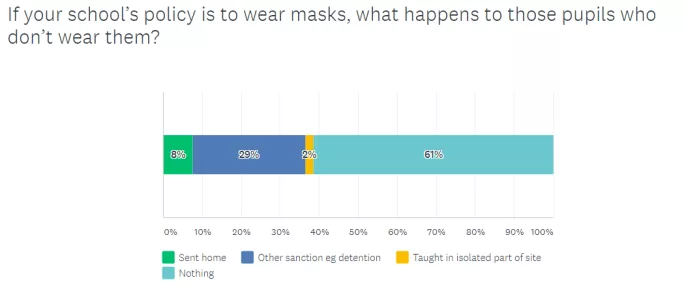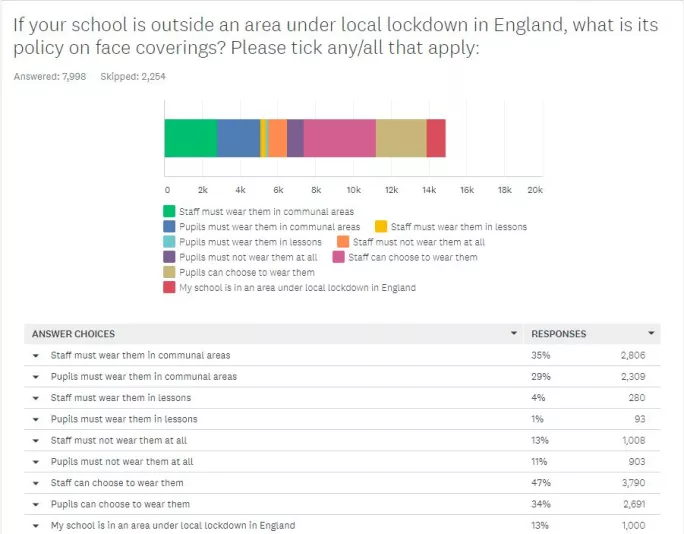- Home
- Exclusive: Students allowed to break school mask rules
Exclusive: Students allowed to break school mask rules

The majority of teaching staff in schools where face masks have been mandatory say students have been getting away with not wearing them, Tes can reveal.
The news comes the day after Tes revealed that hundreds more secondaries in London, Essex and York will have no choice but to make mask-wearing mandatory in communal areas from next week.
The change comes in from Monday because their areas are being moved to a “high” Covid alert level over the weekend.
But a Tes survey of around 10,000 headteachers, teachers and other school staff in England has revealed how difficult it can be to enforce mask-wearing.
Exclusive: Masks mandatory in hundreds more secondaries
Coronavirus: 69% of teachers report Covid behaviour slump
Related: Pupils not wearing masks could be reported to police
Analysis: Do we need masks in schools?
Gavin Williamson: Masks should not be part of school uniform
Asked “If your school’s policy is to wear masks, what happens to those pupils who don’t wear them?”, nearly two-thirds (61 per cent) of school leaders, teachers and teaching assistants in England said “nothing”.
Coronavirus: Breaking the rules on face masks in schools
Of the remainder, 8 per cent said students would be sent home, 29 per cent said they would receive some other sanction - such as a detention - and 2 per cent said those not wearing masks would be taught in an isolated part of the school site.
Geoff Barton, general secretary of the Association of School and College Leaders, said it “isn’t easy” for schools to enforce a policy of wearing masks, because “there are recognised exemptions, and all that a child or parent has to say is that these exemptions apply to them”.
“We would appeal to all students and parents to respect and follow the policies put in place by schools, which are there for good reasons and which have been carefully considered by leadership teams in the interests of the safety of the whole school community,” he added.

The survey, which was carried out last month, also reveals a split among schools outside of local lockdown areas on whether students should have to wear masks.
Asked “If your school is outside an area under local lockdown in England, what is its policy on face coverings?”, nearly a third of staff (29 per cent) said that students were required to wear them in communal areas.
And a further 1 per cent said students must wear masks in lessons.
Conversely, more than 1 in 10 (11 per cent) said students must not wear face coverings at all, while just over a third (34 per cent) said students could choose to wear them if they wished.

There was also significant variation in the rules for staff.
More than a third (35 per cent) of staff in schools outside of local lockdown areas said they must wear masks in communal spaces, and a further 4 per cent said they had to wear them in lessons.
Meanwhile, nearly half (47 per cent) said they could choose to wear masks.
And more than one in 10 (13 per cent) said they must not wear them at all.
When the government revised its policy on masks in schools on 25 August, it said secondary staff and pupils should wear masks in communal spaces, when the school was in an area with local Covid-19 restrictions in place.
For secondaries anywhere else in the country, it was left up to their discretion on whether to require face coverings in indoor communal areas where social distancing could not be safely managed.
Paul Whiteman, general secretary of school leaders’ union the NAHT, said many leaders would feel the government had “passed the buck” when it came to making decisions on mask-wearing in schools.
“It is neither helpful nor fair to ask school leaders to make individual decisions about face coverings in their school,” he said.
“Such decisions should rest with public health officials who have access to the full range of scientific evidence.
“Many school leaders will feel as though the government has passed the buck and handed the most difficult parts of the process over to them. We will continue to lobby the government to take a clear and unambiguous line on this.”
But Mr Barton said: “We agreed with the government’s decision to give schools outside lockdown areas flexibility over whether to require face masks in communal areas because school leaders are best placed to make a decision based on their circumstances, such as the layout of the school and the proximity of people in these parts of the building.
“Schools will have thought long and hard about this decision, given the strong opinions which exist about face masks, and will have carried out painstaking risk assessments.”
A Department for Education spokesperson said: “In local lockdown areas children in Year 7 and above should wear face coverings in indoor communal spaces and corridors.
“Outside of local lockdown areas schools have the flexibility to require face coverings if they believe it is right in their specific circumstances. Face coverings are not required in the classroom as they can hinder communication and pupils’ education.
“Our guidance is clear and children should not be sent home for not wearing a face covering.”
Keep reading for just £1 per month
You've reached your limit of free articles this month. Subscribe for £1 per month for three months and get:
- Unlimited access to all Tes magazine content
- Exclusive subscriber-only stories
- Award-winning email newsletters



